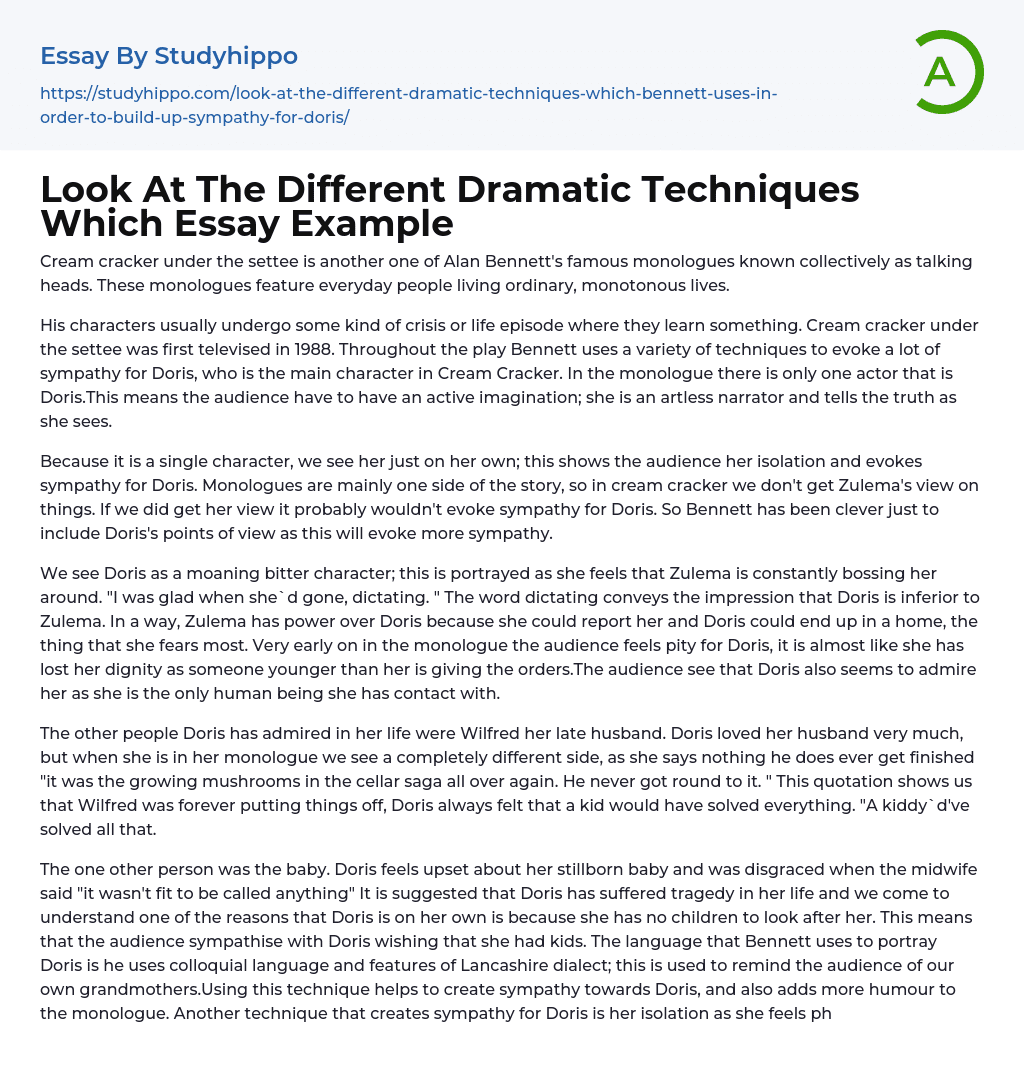

Look At The Different Dramatic Techniques Which Essay Example
"Cream cracker under the settee" is one of Alan Bennett's well-known monologues from the collection called "talking heads". These monologues depict the lives of average individuals living ordinary, uneventful lives.
Typically, Bennett's characters experience a crisis or life event that results in a learning experience. The play, Cream Cracker under the Settee, made its television debut in 1988. Bennett employs various techniques throughout the play to elicit empathy for the main character, Doris. As a monologue, the sole actor is Doris, requiring the audience to utilize their imagination; this allows for an unadorned narration where the truth is expressed through Doris' perspective.
Doris appears alone as a solitary character, emphasizing her isolation and eliciting sympathy from the audience. Since monologues typically present only one perspective, Zulema's viewpoint is absent in "Crea
...m Cracker," and including it would likely result in less sympathy for Doris. Bennett's decision to only include Doris's perspective is a shrewd move that amplifies the audience's emotional response.
We witness Doris being depicted as a grumbling and resentful individual due to her perception of Zulema constantly commanding her. Doris expresses, "I was glad when she`d gone, dictating." The term "dictating" suggests that Zulema asserts a superior position over Doris. In essence, Zulema holds authority over Doris as she has the ability to report her, which could result in Doris being placed in a care home - something that she fears tremendously. At the beginning of the soliloquy, the audience empathizes with Doris and can observe that she appears to have lost her dignity given that someone younger than her is dictating orders. Furthermore, the audience can glean that Doris also seems to hold admiration
for Zulema, considering she is the sole individual with whom she interacts.
The person whom Doris admired apart from others was her late husband, Wilfred. Although she loved him, during her monologue, she reveals a different perspective where she mentions that he never finished anything, just like the uncompleted task of growing mushrooms in the cellar. She believed that a child could have solved this issue. She stated, "A kiddy'd've solved all that."
The sole companion in Doris's life was her stillborn baby, which she was hurt and ashamed about when the midwife declared that it wasn't worthy of a name. It is evident that Doris has faced misfortune, leading to her solitude, compounded by the absence of children to take care of her. This garners empathy from the audience, who wish she had offspring. Bennett's choice of words, including colloquialisms and Lancashire dialect evokes memories of relatable grandmothers, intensifying the audience's compassion towards Doris, while also adding comedy to her monologue. Her isolation in her home, with only occasional visits from her dictatorial helper Zulema, further stimulates sympathy for Doris.
Doris perceives that she lacks permission to undertake anything, leading her to feel powerless. The audience is aware of her admiration for the carpet sweeper, but she is not even authorized to use it. Someone cautions her by saying, "Doris, I don't want to catch you handling the Ewbank."
The Ewbank is off-limits, which brings to mind school rules. This suggests that Zulema is imposing rules on Doris even in her own home. This behavior not only comes off as condescending, but it also highlights Zulema's domination over Doris, leaving her feeling inadequate. Despite her own sense of
identity, as evidenced by her refusal of help toward the end of the play, Doris's bravery shines through.
Despite being offered help and the option to go to Stafford House, Doris insists that she is fine and would rather die in her own home as an individual. This denial of help highlights her clear need for it. Doris has not had freedom for some time and feels like a stranger in her community, stating that she doesn't know anyone around anymore. This signifies a change in society that has left her feeling trapped and disconnected from the pleasant life she once knew where everyone knew each other.
The title "A cream cracker under the settee" plays a crucial role in the monologue, with the cream cracker itself holding significance. Doris feels empowered upon finding it, despite knowing that reporting Zulema to social services would be futile. Being "under the settee" suggests being out of sight and out of mind, symbolizing the position of the elderly in society and how Doris is seen. The cracker also represents Doris's state of mind, as it signifies being "crackers" or not all there. Additionally, the cracker's fragility further reflects Doris's own vulnerability.
Doris's current life is represented by the fact that crackers are uninteresting and tasteless.
- Educating Rita essays
- Book Summary essays
- Metaphor essays
- Reader essays
- Rhyme essays
- Literary devices essays
- Villain essays
- Books essays
- Genre essays
- Literary Criticism essays
- Writer essays
- Protagonist essays
- Simile essays
- Poem essays
- Book Report essays
- Book Review essays
- Greek Mythology essays
- Plot essays
- Tragic Hero essays
- Coming of Age essays
- Play essays
- Rhetoric essays
- Rhetorical Question essays
- Translation essays
- Understanding essays
- Reason essays
- Character essays
- Letter essays
- American Literature essays
- Literature Review essays
- Utopia essays
- Poetry Analysis essays
- Dante's Inferno essays
- Between The World and Me essays
- Incidents in The Life of a Slave Girl essays
- Flowers for Algernon essays
- Myth essays
- Everyday Use essays
- Boo Radley essays
- Genesis essays
- Richard iii essays
- Alice in Wonderland essays
- On the road essays
- Ozymandias essays
- The Nightingale essays
- Holden Caulfield essays
- Animal Farm essays
- 1984 essays
- A Hanging essays
- Shooting An Elephant essays



